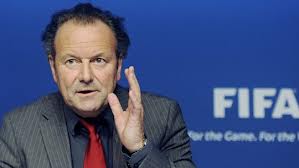By Andrew Warshaw
October 7 – With all the focus on the Qatar 2022 World Cup, a number of other ongoing issues went relatively unreported following FIFA’s executive committee in Zurich last week, not least the announcement that Mark Pieth (pictured), the Swiss governance expert appointed two years ago to make recommendations for change, would be terminating his association with FIFA at the end of this year, by mutual agreement.
It was hardly unexpected after months of awkward relations between the two parties. At this year’s FIFA Congress in Mauritius, Pieth, described FIFA as a supertanker which, far from being steered into calmer waters, was chugging its way along with all manner of baggage on board.
Pieth had already made it clear, in a newspaper interview in Germany last week, that he was leaving the process.
“The future will be a matter of self-regulation,” he was quoted as saying. “If FIFA does not want to take it forward then it does not have to. We cannot force them. I would not take on this sort of task again in such a circus with the various factions attack each other all the time.” But whether he likes it or not, the ‘circus’ is the operating environment.
The decision by FIFA and Pieth (presumably to not renew his contract) was apparently made during the Congress in Mauritius and based on the belief that the Independent Governance Commission (IGC) will have run its course by end of the year and that key governance structures will have been established and passed over to the independent Ethics Committee as well as the Audit and Compliance Committee.
“The exco wants to thank Mr Pieth and his organisation for the help they have provided FIFA to carry out this reform process,” Blatter told reporters on Friday.
The outstanding recommendations, and the most contentious, from the IGC are scheduled to be discussed during the 2014 Congress in São Paulo – the introduction of various terms of office and age limits for officials and the publication of compensation details of key management.
FIFA added in a press release that Theo Zwanziger, the executive committee member charged with fine-tuning the reform measures, would now be “further examining” the issues of age limits and terms of office for senior FIFA officials. So the reform baton has been taken back by FIFA, but the issues will not likely change.
The other issue widely overlooked in Zurich was that Israeli and Palestinian officials will meet within the next four months under the auspices of FIFA to assess levels of co-operation.
Last month both countries agreed to appoint a liaison officer to facilitate the movement of players in and out of the Palestinian territories. Palestine accuses Israel’s security forces, who control movement between the Gaza Strip and the Israeli-occupied West Bank, of frequently preventing its athletes travelling freely between the two separated territories as well as stopping those from visiting countries from entering the West Bank. Israel counters that it is has no choice but to enforce security because the Gaza Strip, from where rockets and mortar bombs are regularly fired, is ruled by the Islamist Hamas faction which calls for Israel’s destruction.
“They are both full members of FIFA but sadly in political terms they don’t have the same rights,” Blatter, who was given a mandate in Mauritius to try and improve the situation in Palestine said. “We have already identified a number of problems that need to be resolved. We shall see how this plays out.”
Contact the writer of this story at moc.l1744381656labto1744381656ofdlr1744381656owedi1744381656sni@w1744381656ahsra1744381656w.wer1744381656dna1744381656
